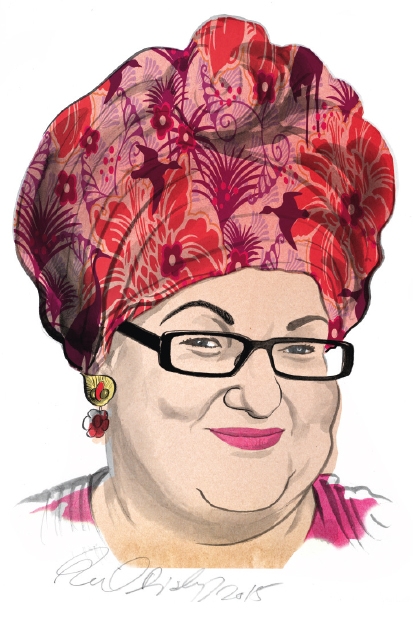A children’s author and illustrator, Jonathan Emmet, created a stir recently by saying that women are effectively gatekeepers of children’s books — chiefly picture books. They constitute the majority of the buyers, reviewers and prizegivers – and the result is that boys are shortchanged. Too few pirates and dragons — or the wrong sort — and too little peril, too little technology, too little non-fiction. Naturally, he’s had to spend a good deal of energy since explaining no offence was intended.
Actually, I think he’s right, and not just about picture books. Children’s books are feminised and I’m thinking of the conflict aversion that takes the form of Red Riding Hood and her granny ending up best friends with the wolf, or the dragon really not wanting to fight St George. If it’s a stab at humour, that’s fine, but what’s pervasive is the sense that fighting is really a bit horrid and we should all just be nice. That’s only true of books for younger children mind you.
Naturally I’ve been brooding about whether I’m part of the problem. I hope not, on account of being more or less a boy or at least a hermaphrodite when it comes to reading. My own tastes were of the Rider Haggard/R.L. Stevenson/John Buchan sort and as a child the books I liked were of the kind that either gender could identify with: E. Nesbit, C.S. Lewis, Lucy Boston, Mary Norton, Joan Aiken and John Masefield. Actually the thing about all of them is that they’re wonderful storytellers and — though you don’t bother about style as a child — fine prose writers. Anyway, the following selection isn’t wilfully pink or blue.
The real cracker is The Letter for the King by Tonke Dragt (illustrated above), in a new limited edition (Pushkin, £7.99, Spectator Bookshop, £7.59), first published in Dutch in 1962, and fluidly translated by Laura Watkinson. It’s an old fashioned quest story, about a youth who is interrupted during the vigil before he is knighted by a man desperate for help; he must take a letter to the king of a neighbouring kingdom, in a language he cannot understand, over mountains and through forests, and defying the implacable enemies who want him to fail. It’s been compared to Tolkien, which it so very much isn’t, but it’s still a wonderfully simple, wonderfully gripping story. Its closeness to its models can be seen in the fact you can tell whether someone is a baddie from his appearance; it holds you.
Half Bad by Sally Green (Penguin, £7.99, Spectator Bookshop, £7.59) begins where Harry Potter leaves off but without the fun stuff or the boarding-school element. If you are a HP fan, you’ll know that there was a disagreeably purist aspect to the policing of the magical world to exclude Muggles — as a political metaphor, a bit heavy. This book takes that idea a stage further, with the world of witchcraft divided between white witches and black ones; the hero here is half and half. The thing is, the white witches are at least as horrible as the black ones in their attempts to eliminate the other lot, and our hero spends the novel pursued and tormented by the notional good guys. It has that crucial element of being internally coherent, which gives the narrative and the chase genuine suspense.
I honestly never thought I’d find myself reading, let alone taken with, a book about the making of a French motor car but The Tin Snail by Cameron McAllister (Jonathan Cape, £12.99, Spectator Bookshop, £11.69) is a thoroughly engaging read. It manages to turn the struggle to invent the Citroen as the first people’s car, and then to keep its design from the German invaders, into a story of the Resistance, which is saying something. Plus it has a human element: the plot revolves round the designer’s young son, and his wan hopes that the car will help his parents stay together. Illustrated with panache in pen and ink by Sam Usher.
A real issue about children’s books is the dearth of illustration for older children, which wasn’t the case up to the 1970s. For younger children there are wonderful picture books. David Lucas is a favourite — unmistakable style, exquisitely stylised — and his latest, Grendel (Walker, £6.99, Spectator Bookshop, £6.64), is a charming take on the Midas story, with chocolate serving for gold.
For children taking up chess — oh, all right, for adults as useless as me — what you need is a simple guide, with tips for the more advanced. This, I gather, is exactly what you get from Usborne’s Complete Book of Chess (Usborne, £9.99, Spectator Bookshop, £9.49). Really useful.
Virago is a welcome new entrant to children’s publishing. The latest additions to its list (both at £7.99, Spectator Bookshop, £7.59) are by Rumer Godden: An Episode of Sparrows, about a tough little London girl’s efforts to create a small garden in the middle of the city; and The Dark Horse, a wonderful account of a problem horse and his disgraced trainer who come to India and end up in the Viceroy Cup — and the role of the Sisters of Poverty in Calcutta in their redemption. Godden is a lovely writer; she has her own Midas touch which captivates the reader with everything she does. I suppose it’s what we’d call crossover fiction — for the adults’ part of the story is as important as the child’s — but that’s good writing and storytelling for you. Not for boys or girls, children or adults, but everyone.







Comments